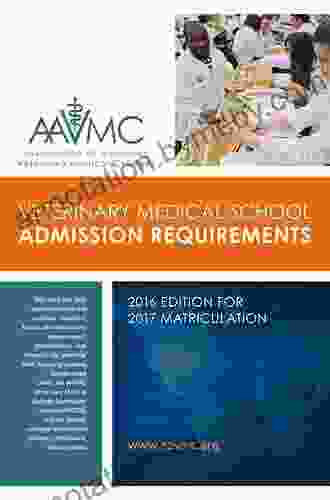Veterinary Medical School Admission Requirements: Everything You Need to Know

Are you considering a career as a veterinarian? If so, you'll need to be aware of the veterinary medical school admission requirements. In this article, we'll discuss everything you need to know about getting into veterinary school, including the required coursework, GPA, GRE scores, and more.
4.8 out of 5
| Language | : | English |
| File size | : | 6841 KB |
| Text-to-Speech | : | Enabled |
| Screen Reader | : | Supported |
| Enhanced typesetting | : | Enabled |
| Print length | : | 541 pages |
Required Coursework
The required coursework for veterinary school admission varies from school to school, but there are some general requirements that all schools share. These requirements typically include:
- Biology
- Chemistry
- Physics
- Math
- English
In addition to these general requirements, many schools also require applicants to take specific courses in animal science, such as:
- Animal anatomy
- Animal physiology
- Animal nutrition
- Animal behavior
It is important to check with the specific schools you are applying to to see what their specific requirements are. You can find this information on the schools' websites or by contacting the admissions office.
GPA
Your GPA is an important factor in the veterinary school admissions process. Most schools require applicants to have a GPA of at least 3.0, and some schools require even higher GPAs. If your GPA is below the average for the schools you are applying to, you may need to take additional coursework or retake some of your classes to improve your GPA.
GRE Scores
The GRE is a standardized test that is required by most veterinary schools. The GRE tests your verbal reasoning, quantitative reasoning, and analytical writing skills. The average GRE score for veterinary school applicants is around 300, but some schools require higher scores. If you are not satisfied with your GRE scores, you can retake the test as many times as you need to improve your score.
Veterinary Experience
Veterinary experience is another important factor in the veterinary school admissions process. Most schools require applicants to have at least 100 hours of veterinary experience, and some schools require even more. This experience can be gained through volunteering at a veterinary clinic, shadowing a veterinarian, or working on a farm or ranch. Veterinary experience will help you to learn more about the profession and to develop the skills that you need to be a successful veterinarian.
Letters of Recommendation
Letters of recommendation are also an important part of the veterinary school admissions process. Most schools require applicants to submit at least three letters of recommendation, and some schools require even more. These letters should come from people who know you well and can attest to your character, academic ability, and veterinary experience. Letters of recommendation can be from professors, veterinarians, employers, or other people who have worked with you.
Personal Statement
The personal statement is your opportunity to tell the veterinary schools why you want to become a veterinarian. In your personal statement, you should discuss your motivations for pursuing a career in veterinary medicine, your experience with animals, and your qualifications for the profession. Your personal statement should be well-written and error-free, and it should be tailored to each school you are applying to.
Applying to Veterinary School
The veterinary school application process can be complex and time-consuming. It is important to start the process early and to give yourself plenty of time to complete all of the required materials. The application process typically includes:
- Submitting a completed application form
- Submitting official transcripts
- Submitting GRE scores
- Submitting letters of recommendation
- Submitting a personal statement
Once you have submitted all of the required materials, your application will be reviewed by the admissions committee. The admissions committee will consider your academic record, your GRE scores, your veterinary experience, your letters of recommendation, and your personal statement. The admissions committee will then decide whether to offer you an interview.
Interviewing for Veterinary School
If you are offered an interview, it is important to be prepared. The interview is your opportunity to make a good impression on the admissions committee and to show them why you are the right candidate for their veterinary program. During the interview, you will be asked questions about your academic record, your veterinary experience, and your motivations for pursuing a career in veterinary medicine. You will also be given the opportunity to ask questions about the veterinary program and the school.
Attending Veterinary School
If you are fortunate enough to be accepted to veterinary school, you will begin a challenging but rewarding journey. Veterinary school is a rigorous academic program that will require you to learn a great deal of information about animal health and medicine. You will also gain practical experience through clinical rotations and other hands-on learning experiences.
After graduating from veterinary school, you will be eligible to take the North American Veterinary Licensing Exam (NAVLE). Once you have passed the NAVLE, you will be licensed to practice veterinary medicine in the United States. You will then be able to start your career as a veterinarian and help animals in need.
Becoming a veterinarian is a challenging but rewarding goal. If you are considering a career in veterinary medicine, it is important to be aware of the veterinary medical school admission requirements. By following the tips in this article, you can increase your chances of getting into veterinary school and starting your journey to becoming a veterinarian.
4.8 out of 5
| Language | : | English |
| File size | : | 6841 KB |
| Text-to-Speech | : | Enabled |
| Screen Reader | : | Supported |
| Enhanced typesetting | : | Enabled |
| Print length | : | 541 pages |
Do you want to contribute by writing guest posts on this blog?
Please contact us and send us a resume of previous articles that you have written.
 Book
Book Novel
Novel Page
Page Chapter
Chapter Text
Text Story
Story Genre
Genre Reader
Reader Library
Library Paperback
Paperback E-book
E-book Magazine
Magazine Newspaper
Newspaper Paragraph
Paragraph Sentence
Sentence Bookmark
Bookmark Shelf
Shelf Glossary
Glossary Bibliography
Bibliography Foreword
Foreword Preface
Preface Synopsis
Synopsis Annotation
Annotation Footnote
Footnote Manuscript
Manuscript Scroll
Scroll Codex
Codex Tome
Tome Bestseller
Bestseller Classics
Classics Library card
Library card Narrative
Narrative Biography
Biography Autobiography
Autobiography Memoir
Memoir Reference
Reference Encyclopedia
Encyclopedia Donald A Norman
Donald A Norman Dominic Merola
Dominic Merola Dinah Pike
Dinah Pike Yuliya Pankratova
Yuliya Pankratova Keith Martin Smith
Keith Martin Smith Don Currie
Don Currie Richard Taylor
Richard Taylor Dick Dorworth
Dick Dorworth Fanny Kelly
Fanny Kelly Joshua Wright
Joshua Wright Jona Tomke
Jona Tomke George Reisman
George Reisman Rox Siles
Rox Siles Deborah Willis
Deborah Willis Edward Rosenfeld
Edward Rosenfeld Diane Cardwell
Diane Cardwell Denis Avey
Denis Avey Rebecca Sheen
Rebecca Sheen Eric Sprinkle
Eric Sprinkle Jeannie Burlowski
Jeannie Burlowski
Light bulbAdvertise smarter! Our strategic ad space ensures maximum exposure. Reserve your spot today!

 Julio CortázarA Little Spot of Love on Valentine's Day: A Heartwarming Story for Readers of...
Julio CortázarA Little Spot of Love on Valentine's Day: A Heartwarming Story for Readers of...
 Walt WhitmanDiscover the Enchanting World of Disney with 'Additional Unofficial Disney...
Walt WhitmanDiscover the Enchanting World of Disney with 'Additional Unofficial Disney... Bryan GrayFollow ·9.9k
Bryan GrayFollow ·9.9k Anthony WellsFollow ·12.8k
Anthony WellsFollow ·12.8k Andy ColeFollow ·6.5k
Andy ColeFollow ·6.5k Liam WardFollow ·7.6k
Liam WardFollow ·7.6k Brent FosterFollow ·12.2k
Brent FosterFollow ·12.2k Mason PowellFollow ·6.7k
Mason PowellFollow ·6.7k Alexander BlairFollow ·18.8k
Alexander BlairFollow ·18.8k Carlos FuentesFollow ·7.6k
Carlos FuentesFollow ·7.6k

 Cruz Simmons
Cruz SimmonsGuide To Pencak Silat Kuntao And Traditional Weapons:...
Immerse yourself in the captivating world of...

 Dalton Foster
Dalton FosterUnlock Your Financial Freedom: Dive into the ABCs of Real...
Are you ready to embark on a...

 George Orwell
George OrwellThe Advanced Guide to Real Estate Investing: Your...
Are you ready to embark on...

 Will Ward
Will WardMargaret Laurence: The Making of a Writer
Margaret Laurence (1926-1987) was one of...

 Jorge Amado
Jorge AmadoThe ABCs of Property Management: A Comprehensive Guide...
Owning and managing rental...
4.8 out of 5
| Language | : | English |
| File size | : | 6841 KB |
| Text-to-Speech | : | Enabled |
| Screen Reader | : | Supported |
| Enhanced typesetting | : | Enabled |
| Print length | : | 541 pages |










